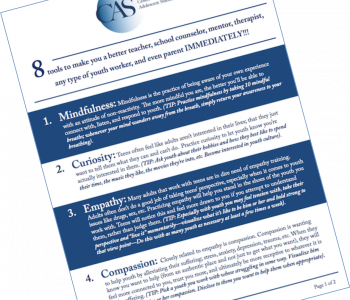

Sam Himelstein, PhD
Sam Himelstein is the founder and CEO of the Center for Adolescent Studies, Inc. He is passionate about working with youth and training the professionals that serve them.
4 Self-Care Tips for Essential Workers During COVID-19
Those of us who work with trauma-impacted youth also have to deal with our own trauma and stress. On top of the stressful nature of the work itself, we’ve all been impacted by our own life events. Over the years, I’ve worked with countless professionals who’ve gone through divorces, have lost family members, or who are still coming to terms with trauma from their own adolescence.
And during this time of the COVID-19 pandemic, many of us are still called upon to continue our jobs as essential workers. We’re dealing with all of the above, alongside navigating a new way to work with youth through telehealth, video calls, and social distancing protocols.
How we respond to stress (both our own and our clients’) is critical to being effective in our work. There are many components to an effective self-care plan, and I’d briefly like to name four of them that work particularly well for me: mindful breathing, daily mindfulness, ego awareness, and a commitment to learning through professional development.
1) Mindful Breathing
A sustainable daily meditation practice will help you deal with stress, strong emotions, and tragedy. Formal practice also aids in building the necessary experience to teach meditation; the more you practice, and the more you go through the meditation instructions, the better able you are to teach meditation to those you work with.
Mindful Breathing is often one of the first forms of mindfulness meditation taught to beginners, but it is also an exercise consistently practiced by veteran mindfulness practitioners. The reason is the breath is always here and now. It’s a beacon that can help us develop a sustained present-moment awareness, and with training we can become proficient and even master the ability to be non-reactive and non-judgmental in the present moment.
Here are a few pointers for getting started with a mindful breathing practice:
- Choose an anchor to stick with prior to starting your meditation. You might choose to focus your awareness on your belly, your rib cage, your chest, or your nostrils. All of these are referred to as “objects,” or “anchors,” or “beacons” that help you return to the present moment when the mind wanders.
- Set your intention for mindful breathing prior to starting. Remind yourself that mindful breathing isn’t about feeling calm, trying to relax, cultivating a sense of serenity, or having no thoughts. Mindful breathing is really about using the breath as a beacon to bring your awareness to the present moment. The mind will inevitably wander. That’s normal. When it does, simply come back to the breath (the anchor you’ve chosen). Explicitly set an intention to cultivate an attitude of equanimity or balance. When the mind wanders, we can practice equanimity. When our back gets sore, we can practice equanimity.
- Set the intention to develop a habit of mindful breathing. Forming a habit to meditate is as much a part of the work as the actual meditation itself. If you don’t have much experience with a meditation routine, I suggest starting with what’s most realistic for you. If that’s only three minutes a day, start there. But don’t finish there. Three minutes of meditation will offer some benefits, but will likely not give you the full spectrum of distractions, narratives, physical sensations, and the whole roller coaster ride of mental experiences.
Here’s a sneak peek from the first course (mindful breathing) our brand new online membership, the Heart Spring Community for Helping Professionals (enjoy):
2) Practice Mindfulness Beyond Meditation
Formal meditation like mindful breathing and other mindfulness meditations are powerful, but I also suggest that you develop an informal mindfulness practice that will help you become more present, manage stress, and meet your goals in a sustainable way.
Being present and mindful while on the meditation cushion doesn’t always carry over into daily life. Informal mindfulness helps us to be consciously aware of what we’re doing as we go through our day and interact with our families and the people we work with.
Almost anything can be turned into everyday mindfulness practice: walking, washing the dishes, talking with friends, eating, and so on. For me, one of the primary reasons I maintain a practice of formal meditation is so that I can be compassionate and balanced during conflict, and passionate, energetic, and present when doing something that I love.
I’ve experienced a bidirectional relationship between informal daily mindfulness and formal sitting meditation. The more I practice one, the more benefit I reap when practicing the other.
3) Increase Ego Awareness
We all have the best of intentions, but it can be challenging to remember them while we’re in the trenches of everyday life: when we’re upset at our partners, when a client offends us, or when a work colleague ‘does that thing again.’
It’s important to become aware of what motivates us, what we may fear, what we desire, and how we can show up in our relationships as authentic human beings. In my case, I’ve learned to be less reactive, more compassionate, and more aware of my triggers. Because of this, I can more skillfully respond to youth (and people for that matter) in a challenging moment.
Retreat practice, formal sitting practice, and daily mindfulness have all aided greatly in my continuing growth in ego awareness, a very important aspect of self-awareness. I also gravitate toward personality typing systems like the Enneagram. The Wisdom of the Enneagram by Don Richard Riso and Russ Hudson is a very useful overview of how we can become aware of our personality, understand it, and step outside its bounds when it gets in our way.
I’m an Enneagram Type 8, which means I can be frank, stubborn, and controlling, and I can also be deeply caring and compassionate, as well as a very strong leader. I’m at my best when I remind myself to assess whether my frankness might hurt someone, whether my stubbornness is a way to push an outcome I want, and whether feeling defensive and angry really has a root in feeling a loss of control. This isn’t always a fun or easy process, but it helps me make conscious choices about the best way to respond in a given situation. And when I’m able to pause, “catch my ego in the act” and the intentionally choose to step outsides its bounds, I am able to be fully present, attuned, and not simply at the whim of the natural flow of where the ego tends to go. This is what I call, “rubber to the road, ego transcendence.” It’s not a unitive experience with the oneness of the universe. In fact, it can be a very difficult experience to go against the flow of where the ego wants to go. When it happens though, I can be much more skillful and help my clients and the people I care about to a much higher degree.
4) Commit to Professional Development
Lifelong learning is another critical aspect of caring for ourselves that also helps us work more effectively.
Professional development helps us:
- polish our existing skills;
- learn new ways to serve our patients, students, or clients; and
- receive support from empathetic colleagues.
I created the Center for Adolescent Studies because it was difficult for me to find the type of training I needed when I began working as a therapist. I wanted to focus on how mindfulness, building relationships, and trauma-informed care can have a positive impact on marginalized youth.
And recently, we launched the Heart Spring Community for Helping Professionals, an online membership that includes monthly live webinars, interactive Zoom meetings, and an evolving library of online courses all with the focus of developing self-care and resilience tools for us as providers and to teach those we work with. While this had been in the plans for sometime, I have to admit that it was galvanized and sped to ahead of where it originally was in the calendar because of the COVID-19 pandemic.
It has become strikingly clear in these trying times that we has helping professionals are essential resources for the larger community, and therefore need to invest in ourselves to better help those we serve.
I urge you to find a supportive community where you can continuously polish your skills and also have an opportunity to focus on your own self-care. You are more than welcome to explore the Heart Spring Community for Helping Professionals, and I hope you considering joining.
—
Self-care is one of the most critical ingredients for helping professionals to do their jobs well, especially for those of us working with trauma-impacted youth and populations, and those continuing to work as essential workers during this pandemic. We encounter deep pain and hear of terrible experiences, and we need to come to terms with this in a healing, sustainable way.

